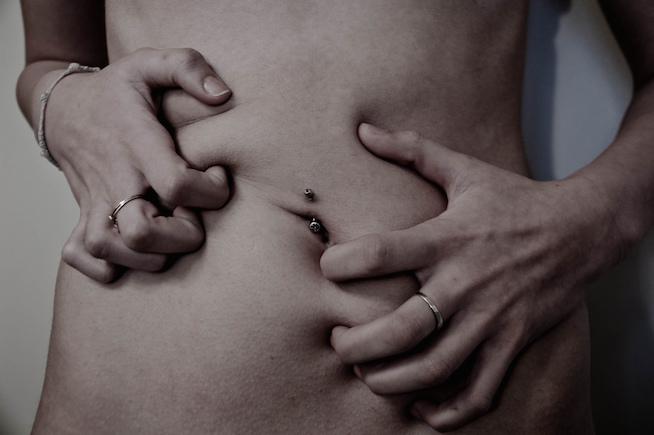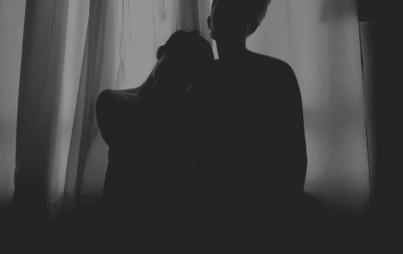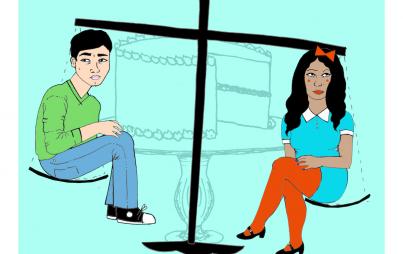
Have you ever noticed how utterly fascinating pizza is to look at? The way that the mozzarella melts in the oven and then coagulates upon cooling, leaving it suspended off of the slice, but not dripping. The way that tiny clumps of Parmesan sit in shallow puddles, soaking up the grease, and then ever so slightly crumble.
I’ll be forthright: I’m the hero of this story.
Further still: I’m also the adversary. The conflict is me. “Man vs. Self,” they call it in literature courses.
The denouement, for the record, was pizza.
Let’s start there.
But first, to clear up any misconceptions that I fancy myself a unique and delicate flower with a unique and delicate story to tell: It’s not true. My eating disorder story is not special. It’s important — because everyone’s struggles are — but mostly only to myself and those who choose to love me. My eating disorder story isn’t as honest as Stephanie’s or as witty as Lori’s. It isn’t as beautiful and tragic as Marya’s. It isn’t even inspirational. It’s boring — typical — as far as eating disorder narratives go. But it’s mine.
Now, the pizza was spinach and broccoli.
My friend was sitting across the table from me. I’m sure that he was saying something riveting — recounting an OKCupid-induced first date or idly complaining about his job — but I was entirely fixated on the pizza perched in front of me.
Have you ever noticed how utterly fascinating pizza is to look at? The way that the mozzarella melts in the oven and then coagulates upon cooling, leaving it suspended off of the slice, but not dripping. The way the tiny clumps of Parmesan sit in shallow puddles, soaking up the grease, and then ever so slightly crumble. The way a well-oiled crust glistens under fluorescent restaurant lighting. If food is pornography, then pizza is Deep Throat: classic, and both deeply satisfying and disappointingly dissatisfying at once.
I tore off a piece of crust with my fingertips and popped it in my mouth, crunching through its outer layer to get to the pillowing softness underneath.
“Do you know how many calories are in this?” I asked.
That was my only party trick at the time — still kind of is, if you want to know the truth — being able to name calorie counts. When my brother was in middle school, he memorized 100 digits of pi. Over the course of 2008, I memorized how many hundreds were in any given slice of pie. Neither are particularly useful achievements.
That part of my life is kind of hazy in memory — maybe because I didn’t have enough brain power to successfully compartmentalize my thoughts — but when I look back on what I do remember, I feel like every conversation I was a part of mostly involved my incessantly monologuing about intake, output, calories, exercise, tips and tricks, and myths and facts.
People nodded at me awkwardly and feigned interest, kind of how you treat a kid who wants to show you their art (medium: Crayola crayon on printer paper). I imagine everyone in my life was tired of my one-woman calorie-counting show. It’s hard to razzle-dazzle your audience when you’re trying to saw yourself in half.
My friend looked up at me, stony in his face and tired in his eyes, and he said, “I think you have a problem.”
My touch left a streak of orange grease on my napkin.
“I don’t have a problem,” I said.
“No, I really think — ”
“I don’t have a problem,” I repeated, this time with my voice raised. And then, spitting defiance, “You’re just jealous.”
Suddenly, crashingly, every particle of thought in my mind converged to form one terrifyingly honest possible truth: No, he wasn’t.
In a culture so utterly obsessed with dieting and the mind-controlling falsehood that quick-and-easy weight-loss is a matter of self-control and will power, restrictive eating disorders are revered as miracles, their partakers lifted to the status of sainthood.
Hell, even the first recorded case of anorexia in history lists it as a beautiful religious phenomenon, a divine devotion to God. It’s why every mainstream media depiction of eating disorders always centers around anorexia — because we can romanticize that. Binging? Purging? Not so much. But as a society, we’re enchanted by the thought of refusal, of transcending our instinctive need to eat.
And in my delusion, I thought that of course someone on the outside would be envious of the feat that I’d been able to achieve. I could live off air if I wanted.
But despite what the Depths of Hell (also known as pro-ana thinspo blogs) might tell you, there isn’t anything breathtaking or ethereal about three-digit daily intakes. Mostly you just sleep a lot.
And when you are awake, you’re constantly haunted by the black wisps of smoke that creep through your peripheral vision, threatening to force you to the floor. You’re agitated all the time. You snap at people. Your friends stop calling. And your entire active thought process is filled with nothing but numbers — calories and ounces and pounds, sets and repetitions. Also, lanugo.
There’s nothing to be jealous about. It isn’t pretty.
And the moment that I realized that my life had become a pathetic disaster that no one in their right mind would ever be jealous of, I hit the point of no return.
Denouement.
See, this is where most eating disorder stories stop. This is when the next chapter in the memoir isn’t a chapter at all, but an afterword. It’s when the author, in a few short paragraphs, describes that yeah yeah yeah, recovery is a long and winding road, but it’s so much better than living with an eating disorder. Oh, and here’s a nice little inspirational quote about resilience to end with.
Because no one really cares about the part where you save yourself. They only want to hear about the torture. But I would argue that this is really where my story begins — at life after death.
Because despite how angry I was that night — angry at him? At myself? At the fact that my eating disorder didn’t allow me to order dessert? — two weeks later, I sat alone in my office at work, listening to hold music on the phone as I practiced my lines: “Hi. I was hoping I could make an appointment to come in soon and talk to Dr. Smith. I think I’m having some issues with food.”
And despite the fact that while that hold music looped, I stared at my desk calendar, counting off the days until Thanksgiving, thinking to myself, “No. I can lose just five more pounds. And then I’ll call and get better. Just five more pounds,” I stayed on the line, and I made that appointment.
And despite my calling best friend crying from the exam room, “They want to put me on medication. I’m supposed to be an adult, and I can’t even take care of myself without medication,” I filled the prescription.
But “despite” shouldn’t even be the word that I’m using. It’s more like “in spite of.”
Because that’s what I learned to be: spiteful toward my eating disorder.
But first, I needed someone, something to give me the permission to distrust, disobey, destroy my own thoughts.
For me, the denouement was pizza.
What will yours be?








